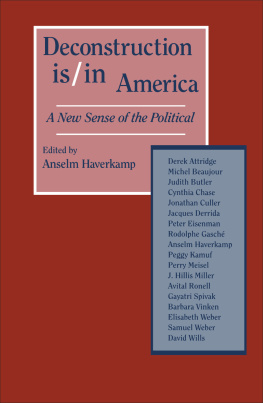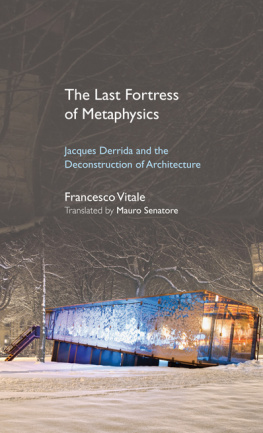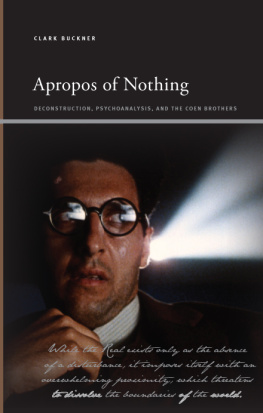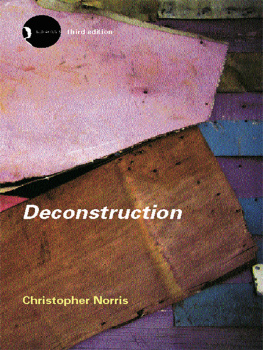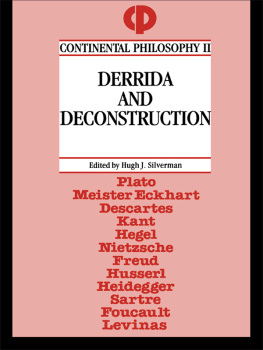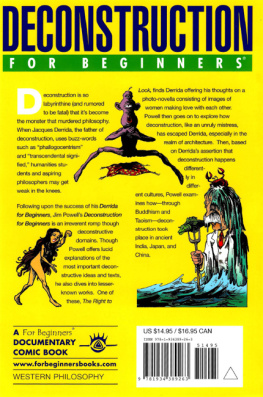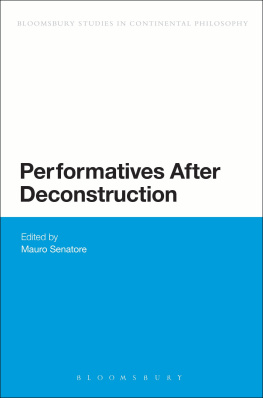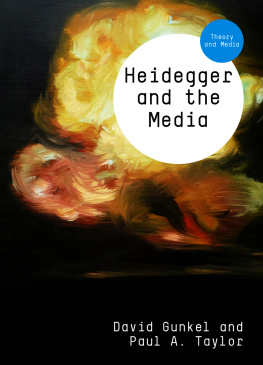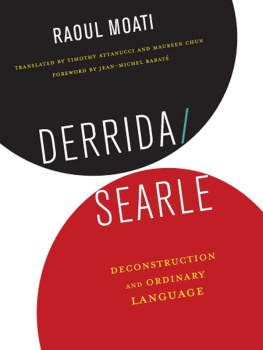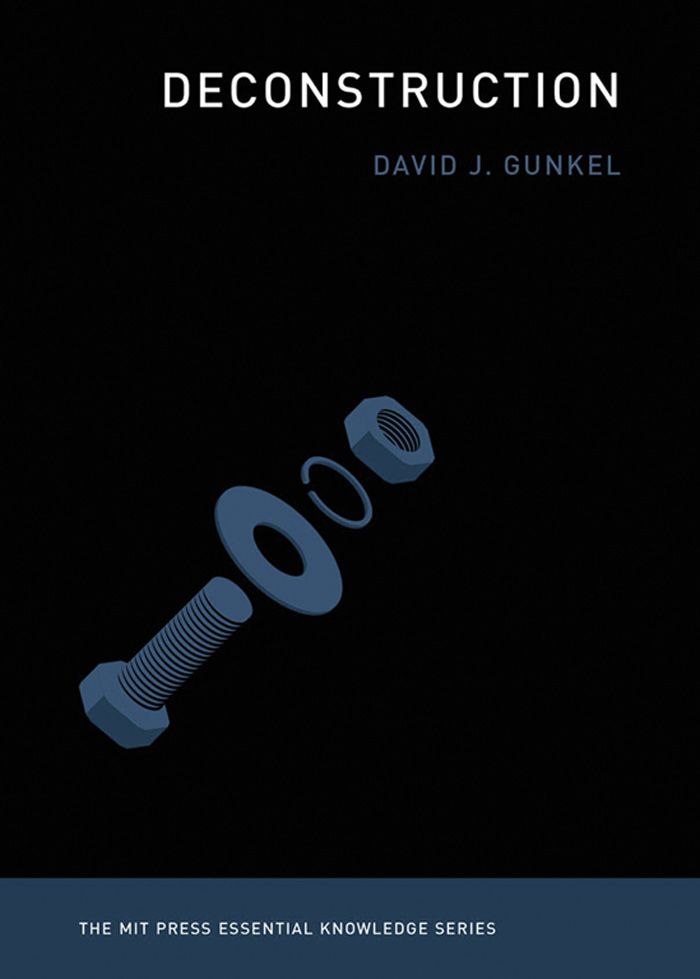
Deconstruction
The MIT Press Essential Knowledge Series
A complete list of the titles in this series appears at the back of this book.
Deconstruction
David J. Gunkel
The MIT Press | Cambridge, Massachusetts | London, England
2021 Massachusetts Institute of Technology
All rights reserved. No part of this book may be reproduced in any form by any electronic or mechanical means (including photocopying, recording, or information storage and retrieval) without permission in writing from the publisher.
This book was set in Chaparral Pro by New Best-set Typesetters Ltd.
Library of Congress Cataloging-in-Publication Data
Names: Gunkel, David J., author.
Title: Deconstruction / David J. Gunkel.
Description: Cambridge, Massachusetts ; London, England : The MIT Press, 2021. | Series: The MIT Press essential knowledge series | Includes bibliographical references and index.
Identifiers: LCCN 2020031703 | ISBN 9780262542470 (paperback)
Subjects: LCSH: Deconstruction.
Classification: LCC B809.6 .G865 2021 | DDC 149/.97dc23
LC record available at https://lccn.loc.gov/2020031703
10987654321
d_r0
In memory of my friend and colleague Ciro Marcondes Filho
Contents
Series Foreword
The MIT Press Essential Knowledge series offers accessible, concise, beautifully produced pocket-size books on topics of current interest. Written by leading thinkers, the books in this series deliver expert overviews of subjects that range from the cultural and the historical to the scientific and the technical.
In todays era of instant information gratification, we have ready access to opinions, rationalizations, and superficial descriptions. Much harder to come by is the foundational knowledge that informs a principled understanding of the world. Essential Knowledge books fill that need. Synthesizing specialized subject matter for nonspecialists and engaging critical topics through fundamentals, each of these compact volumes offers readers a point of access to complex ideas.
Preface
I have been involved with deconstruction from the beginning of my professional career. I came of age, academically speaking, at the end of the twentieth century. During that time deconstruction was the cause clbre in a variety of academic fields and disciplines, and I had the unique opportunity to study and work with a number of the leading innovators in philosophy and deconstruction: John Sallis at Loyola University in Chicago and David Farrell Krell and Michael Naas at DePaul University. I also had the good fortune to have met and talked with Jacques Derrida on two occasions. The first was at a conference that John Sallis had organized to commemorate the hundredth anniversary of the birth of Martin Heidegger. The event was held at Loyola University in Chicago, September 2124, 1989. The second took place during the colloquium Das Unheimliche: Philosophy, Architecture, The City, which was organized by David Farrell Krell at DePaul University, April 2627, 1991.
My own research efforts have sought to develop the equivalent of an academic API (application programming interface) between deconstruction and the philosophy of technology. This work began by way of an engagement with architecture and collaborations with one of the architects involved in the DePaul University colloquium: Ben Nicholson, who was, at that time, attached to the Illinois Institute of Technology. These interactions resulted in a number of publications, museum exhibits, and a documentary film about the B-52 bomber, produced and directed by Hartmut Bitomsky.
Shortly thereafter, I began connecting the dots between the techniques of deconstruction and information and communication technology (ICT), using what I had learned from Derrida and others to facilitate deconstruction of the Internet, virtual worlds, digital computers, and artificial intelligence. But there was, as I discovered, one persistent obstacle to the success of this endeavor. Few individuals outside the very small community of academic philosophers with whom I had been associated knew what deconstruction was, or worse, had a mistaken understanding of what they thought it must be from the numerous misrepresentations that had been (for better or worse) easily available in both the academic and popular media. In an effort to address this problem, I included in my first bookHacking Cyberspace (2001)an appendix with the rather ham-fisted title Deconstruction for Dummies. And in every book since that first publication, I have found it necessary to update, rework, and/or reiterate that basic explanation in one way or another.
This book is the product of what is now a quarter century of effort to make sense of deconstruction and to make it make sense in a way that can directly address the opportunities and challenges of the twenty-first century. It leverages the successes and frustrations of these previous explainers and provides a presentation of the material that is accessible, concise, and easy to use. Like all the EKS titles, Deconstruction has been deliberately designed to get readers up to speed quickly and efficiently, providing both novice and pro with a compact and accessible version of the fundamentals. What is called deconstruction has had the unfortunate reputation for being heady intellectual stuff for ivory-tower navel-gazers. This book is designed to deconstruct that, and bring it all down to earth.
The specific approach to the material that is presented here has benefited from decades of interactions and conversations with individuals and communities who have made a real difference in my own life and work. I cannot possibly name them all. But there is one individual who needs to be explicitly identified, my wife Ann Hetzel Gunkel, who has been my constant companion and sounding board for all of these things since before graduate school. This book would not have been possible without her love, support, and incredible insights into all things academic and otherwise.
Finally, the writing took place and had its place during the period of self-isolation that was imposed on the world in response to the COVID-19 pandemic in the early months of the year 2020. In the numbered sequence of titles bearing my name, this is my thirteenth book, which some might interpret as an unlucky number. And at times it seemedin the face of the uncertainties and incomplete information regarding the virus and its impactthat it might be accompanied by misfortune. At this pointat the time of the writing of this prefaceall of this remains undecidable. But thats life. And, as we shall soon see in the pages that follow, thats also deconstruction.
1
Introduction
Deconstruction, the word at least, is familiar, perhaps too familiar. We rush to purchase the newest deconstructed jackets and slouchy bags from designer labels to wear to events in newly rehabilitated historic buildings that have a deconstructivist architectural aesthetic where we enjoy deconstructed salads while debating the fine points of the current administrations plan to deconstruct one or another aspect of the bloated welfare state. Despite this seemingly unrestrained proliferation of the word across the vernacular, deconstruction remains a kind of slippery signifier and empty placeholder. We all kind of know or at least think we have a sense of what the word indicates. And yet, if you ask someone to explain it, what you typically get is a rather confused shell game of word substitutions, where deconstruction is loosely associated with other concepts like disassembly, destruction, reverse engineering, or the act of taking something apart.
Next page

